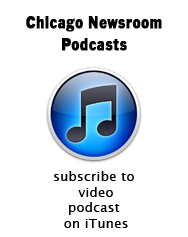Mayor Harold Washington died in office thirty years ago this Thanksgiving. It was November 25, 1987, and for those of us who knew him in some way we’ll always associate the day before Thanksgiving with his sudden death while seated at his desk at City Hall.
We called a group of Harold Washington veterans to our table this week to share some memories and look forward a little. We summoned a lifelong friend and City Hall insider; a member of the City Council opposition; an Alderman elected to the Council during a special election that changed the council’s composition to give Washington the majority, and a journalist who covered Washington for local and national audiences.
Jacky Grimshaw became Washington’s director of Intergovernmental Affairs. She had known Washington most of her life, growing up in the 3rd Ward and attending church and political functions with him for years. “And so the professional relationship really began when he was running for the Illinois State Senate,” she tells us. “So from that election to the 1987 Mayoral Election I did the precinct coordination for every one of Harold Washington’s campaigns.”
Patrick O’Connor joined the City Council in 1983, the same year Washington was elected. But he was, in a way, an accidental Alderman. Ivan Rittenberg, the incumbent, was in the Jane Byrne camp. He was for Richard M. Daley. He ran, he tells us, mainly to “tie up” the Byrne forces so they’d have to spend time defending the Ward and they couldn’t go elsewhere to help Byrne.
Throughout the primary, all the attention was on Byrne and Daley. Little attention was paid to the black candidate despite his huge voter registration drive. In the end, O’Connor found himself in a runoff with the incumbent Alderman and he won in the April General election. Washington won the primary, of course, but he then found himself in vicious general election with a Republican who ran a racially-tinged campaign. O’Connor tells us that, ironically, Harold Washington helped him win the Ward.
“I think that the folks that were working for the incumbent alderman made a significant mistake,” he explains, “because they jumped into the mayoral thinking that that was also going to sweep them in and actually I think what it did is that as the race took on a tone and a tenor it was really quite ugly in a lot of ways. People began to look and say, “I don’t want to be part of that.”
In the Council, O’Connor joined the opposition, but says he kept an open mind when it came to working with the Mayor on Ward issues. “While we were divided in terms of ultimate votes we tended to work together on things that we thought were important,” he tells us. “I voted for every one of Harold’s budgets, so you can say that I was part of the opposition getting to a budget, but when a budget passed I voted for those budgets. Now, that’s not to say that Harold and his administration didn’t work hard to get those votes, and it’s not to say that I didn’t extract everything I could from them in order to vote for.”
Jesus “Chuy” Garcia, Rahm Emanuel’s opponent in the most recent Mayoral race, came into the Council after a special election ordered by a federal court. A coalition of community leaders had challenged the 1981 Ward re-map, arguing that it diminished black and Hispanic representation in at least seven wards. After months of negotiation, Judge Charles Norgle approved a new Ward map and ordered the 1986 special election. The election changed the racial makeup of the Council, probably forever, and awarded Washington a tied Council, 25-25. But the Mayor’s tie-breaking vote gave him control for the first time.
“It was a fantastic experience,” recalls Garcia. “It was finally having an opportunity to govern more normally, and to finally enable the Mayor to get a grasp on the reins of government in Chicago and make the appointments to boards and commissions, and finally have the engine humming along and moving Chicago forward, so it was a great time.”
Washington, however, would live only a little more than a year after the victory.
Cheryl Corley, now a Chicago and Midwest correspondent for NPR, was at the time WBEZ’s City Hall reporter. She recalls that, in addition to Washington’s challenges in the City Council, he also faced constant challenges among his friends.
“He also had to coalesce people in the black community, because there was a lot of separation there as well,” Corley says. “And so he was pretty adept at being able to do that, because you have black nationalists who supported him and who were very instrumental in getting things happening, and black religious leaders and black politicians as well. So it was kind of the combination of a lot of folks from the civil rights movement, the nationalist movement and regular electoral politics all coming together in this one guy who was able to make that happen.”
Convincing Harold Washington to run wasn’t easy, according to Grimshaw.
“Harold would tell me all the time that he was congressman for life,” she remembers. “He knew that the first congressional district would elect him. That he just had to make sure he just stayed true to his principles and the promises he made and he would never have to worry. So when all the drafting was going on – who is going to be the black candidate, and they finally said, “Harold,” and Harold kept saying no. And I would talk to him on a regular basis and he said, “No, I don’t want to do that.”
He did eventually agree to meet with the organizers, but he laid out some demands including cash commitments and voter registration.
“And of course the folks were intent, so they got the black business folks together. They committed $250,000 I think was the amount of money. The other thing was that he wanted 50,000 new registrants. Well, it ended up being more like 200,000 registrants,” concludes Grimshaw.
Once in office,Harold Washington liked to say “I’m gonna be your mayor for the next 20 years.” We ask our guests to speculate. If Washington had been a twenty-year Mayor, what might he have accomplished? How would Chicago be different if Washington, rather than Richard M. Daley, had been mayor through the 90’s and into the oughts?
Corley says by the time of his death even communities that didn’t vote for him and had opposed him were beginning to recognize his desire for equity. A recognition, she says, “that he is responsive, and that he wants to bring a City that has been separate and divided for such a long time together and find common ground…But Harold also reaches out to groups that had been largely invisible, that didn’t have political clout like the LGBTQ community, the Arab community, the Muslim community.”
“I think there would have been a greater emphasis on getting at the concentration of poverty in Chicago, especially on the west and south sides,” she continues. “I think he would have been a much stronger spokesperson on the question of replacing the demolished housing, public housing that occurred in Chicago, and lastly, on the question of crime and the violence that those conditions have bred in Chicago, he was keenly aware of problems in the Police Department as it relates to police brutality and violations that occurred historically in certain parts of the City. So I think that would have been addressed in a different manner, because remember Harold Washington broke with the regular Democratic organization over the issue of police abuse, police brutality in the black community. So the consciousness of those daily realities of people probably would have led to different strategies being deployed.”
“I think he was one of the first Mayors to basically say, “I’m going to be responsible for the education of our children,” and that’s something that I think has carried through the Mayors currently,” O’Connor tells us. “I mean I don’t know a city that’s more invested in the public education than the City of Chicago right now. But I will say this, Chicago is a better City today for having had Harold Washington become the Mayor. I don’t think that there is any doubt that that’s true.”



